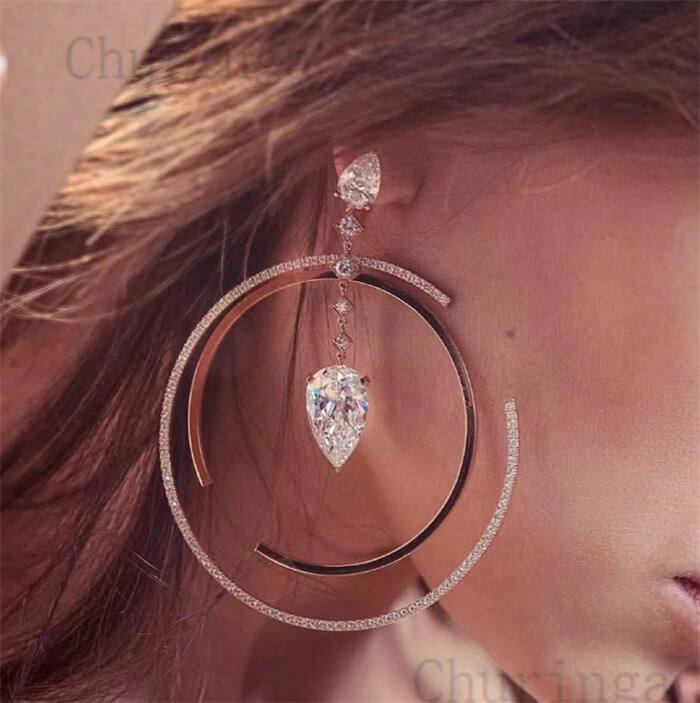When it’s time to shop for an engagement ring, the first thing that probably comes to mind is the diamond. And while that is and always will be the center of attention, choosing the right precious metal is just as important.
Aside from the visual preference of the precious metals (platinum vs yellow gold vs white gold vs rose gold), there are many aspects to consider when choosing one type of precious metal over the other, such as hypoallergenic proprieties, price, durability, and how the metal will complement your diamond centerpiece. These are but a few of the details that you need to mull over…This precious metal comparison will help you make an informed decision when choosing an engagement ring. That way you can shop with complete confidence and peace of mind knowing that you will be buying an engagement ring that suits her needs and style.
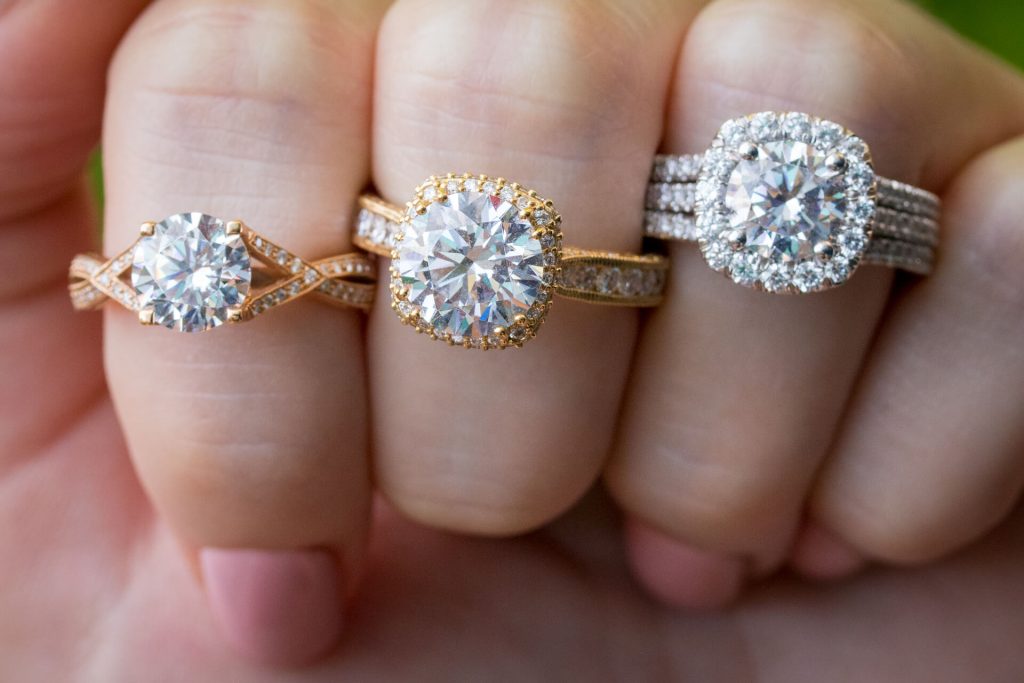
WHAT IS THE BEST METAL FOR AN ENGAGEMENT RING?
The best metal for an engagement ring depends on the person who will be wearing it. You need to think about the proprieties of the metal, her skin tone, the diamond centerpiece, aftercare, durability, and other pros and cons. Not to mention, your budget. All of these factors depend on individual demands, preferences, and lifestyle.
To come to a conclusion on what is the best metal for an engagement ring for you, we will do a comparison of each of the precious metals, one by one, going over all the various aspects of the metal that you need to know. We will also provide visual examples so you can see the metals in engagement ring form for yourself.
Additionally, we will be looking at options of mixing metals for that ever-coveted two-tone look.
After reading this, you will undoubtedly know what metal is right for you!
GOLD
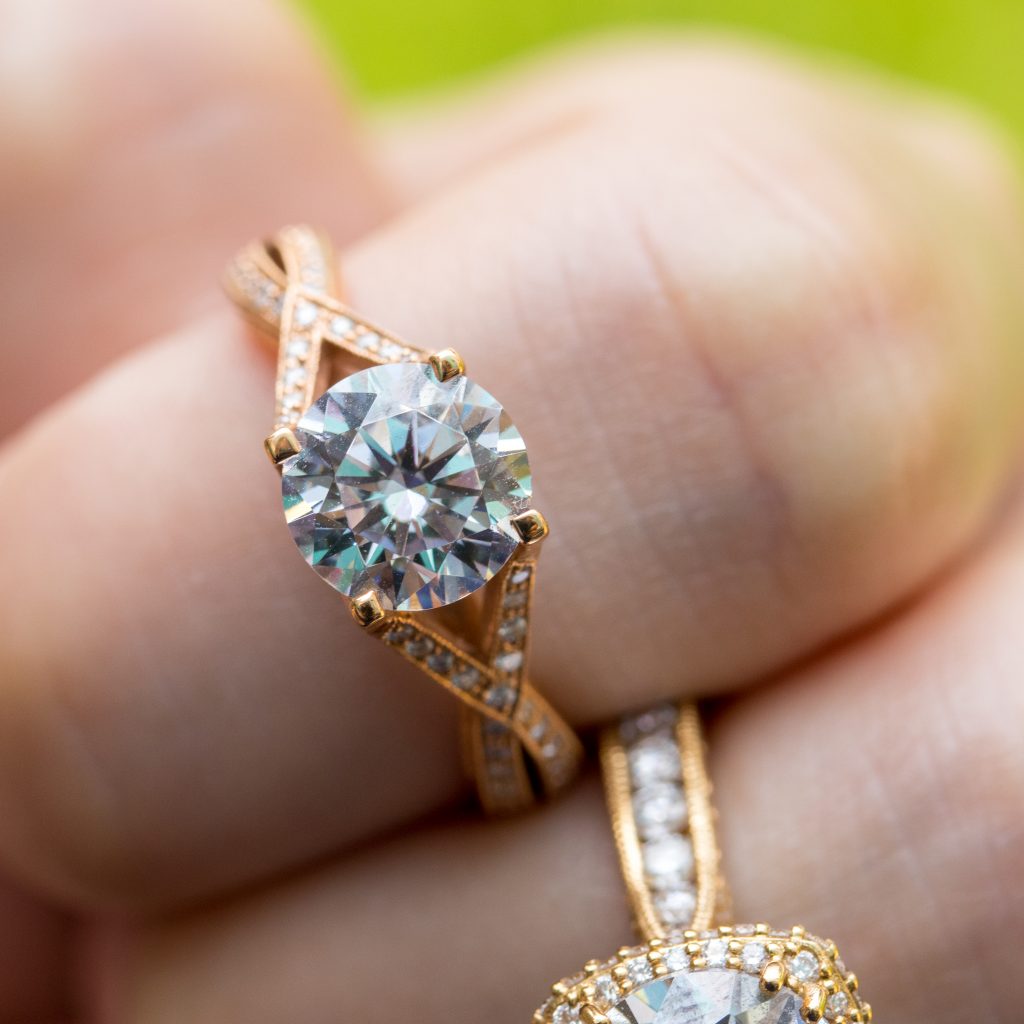
Gold has been the fundamental metal for high-end jewelry since as far back as 560BC. Throughout history, it has been used for religious ceremonies like weddings, as a declaration of status, and simply as decoration for affluentials.
It’s not by chance that gold was made the “golden child” of metals. The desirability for gold comes down to a combination of beauty, versatility and rarity. In terms of versatility, gold is both ductile and malleable, which allows it to be easily crafted into different shapes. Moreover, pure gold is a hypoallergenic metal, which is good for people who are sensitive to certain types of metal.
Gold is measured in carats and divided into 24 parts. So, pure gold (Au) is 24 carats. While jewelry of the past was mainly pure gold, the vast majority of modern gold jewelry is mixed with other alloy metals, as to strengthen its durability. Thus, you have 18k, 14k, and even 9k gold, with the former being the most common.
Alloy metals include silver, copper, nickel and zinc. Depending on the alloy used, the gold will have a unique color. This is why rose gold, white gold, and different shades of yellow gold exist.
Each type of gold has its own special qualities thanks to the underlying alloy metals, which we will now discuss…starting with the king of golds, yellow gold.
YELLOW GOLD ENGAGEMENT RINGS
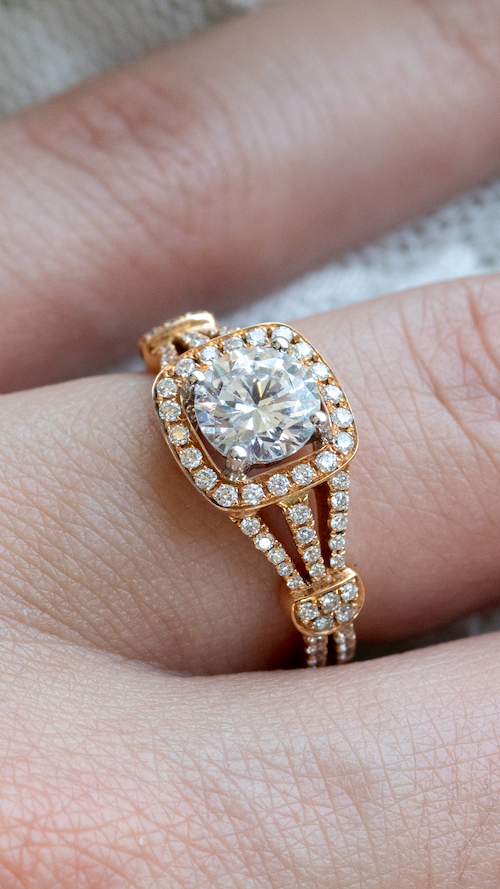
While yellow gold is not the most common metal for engagement rings, it is the most traditional. It was the first precious metal to be used for engagement rings and it is the most historical metal for jewelry as a whole.
After white gold was created in the 1920s, yellow gold engagement rings lost some popularity. However, it is regaining favor nowadays, seemingly taking back the engagement ring throne. People consider yellow gold to be classic yet fashionable.
Yellow Gold Aesthetics
Yellow gold is the king of gold. When you think of gold, yellow gold will always be the gold that comes to mind. The aesthetic of yellow gold is outstanding. It provides a warm, soft, gorgeous luster. It’s a color that immediately brings success and winning to mind. The luminous yellow tone is for people who want the beauty of gold in its most natural state.
What Skin Tone is Best for Yellow Gold?
Yellow gold engagement rings look stunning on darker or olive-colored skin tones.
Yellow Gold Properties
Gold jewelry can be pure 24 carat gold. However, at 24 carats (100% purity), it is too soft for an engagement ring, so it can easily scratch and get deformations. This is why most yellow gold engagement rings are 18k (75%) or 14k (58.5%) gold, as the alloy metals make it more durable and resistant to scratches.
18k and 14k yellow gold maintain the natural yellow color of gold by using zinc and copper as its alloy metals. Zinc is a greenish color while copper is a red color, and as most of us know, red and green makes yellow.
Note: some yellow golds use silver or cobalt to the same effect.
With that understanding, depending on how much of any given alloy metal is used, yellow gold can vary in its yellow tone. Therefore, not all 18k or 14k yellow golds are alike in color. Yellow gold can range from a light yellow to a deep, strong yellow.
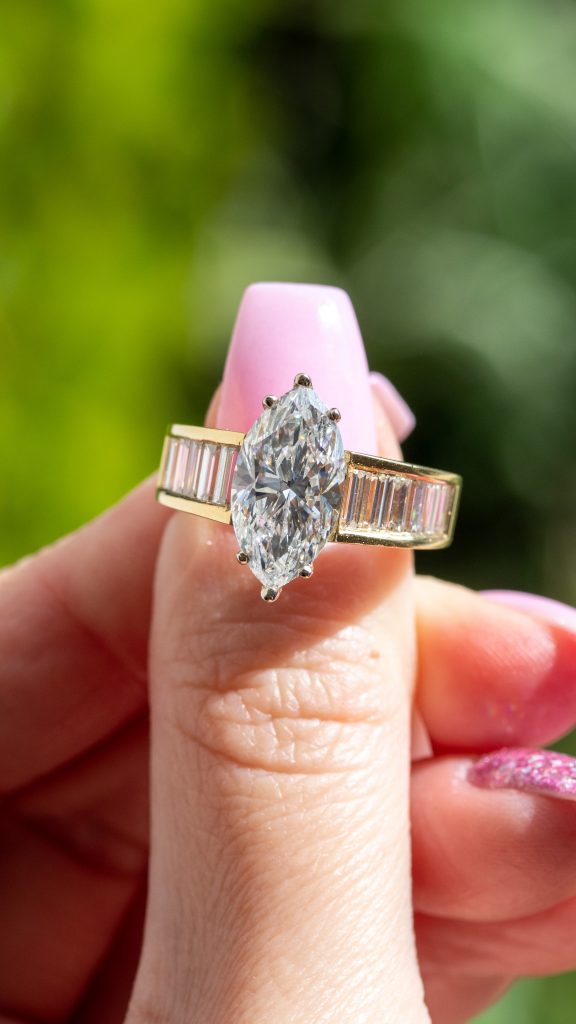
Advantages of Yellow Gold Engagement Rings
First, yellow gold is the most hypoallergenic of all the gold metals. Thus, it is the least likely to cause an allergic reaction.
Second, yellow gold will not rust, tarnish or corrode. Moreover, it will not lose its color over time. In fact, most people cherish yellow gold’s ability to improve with age. The patina of yellow gold is like no other precious metal, it has a luster that you can truly cherish.
Lastly, yellow gold is very malleable, even at 18k and 14k. This means you can have very fine, intricate engagement ring designs. Furthermore, you can resize your yellow gold engagement ring with ease.
The downfall to its malleability is yellow gold does scratch. Again, even at 14k, and more so at 18k. However, a simple polishing will make it like new again…even though most people won’t polish their yellow gold ring because they appreciate the luster of the “old” yellow gold.
Best Diamond Color Grades for Yellow Gold Engagement Rings
Because yellow gold is, well, yellow, you can get away with a lower color grade and still have the same effect as a higher color grade diamond would on white metal. The slightly yellow hue of a lower color grade diamond will not be noticeable as the diamond will reflect the yellow from the gold setting no matter what grade it is.
Certain diamond shapes show more color than others due to the facets, so below is a good guide to follow if you choose a yellow gold setting. With this, you can get the best bang for your buck.
Round Brilliants: K-M color grade
Princess, Asscher and Emerald: J-K color grade
Marquise, Oval, Pear, Heart shape: I-J
Yellow Gold Engagement Ring Aftercare
Yellow gold can dull over time from contact with detergents, moisturizers, and other chemicals. Ideally, you can take the ring off when using these substances. However, even if you don’t, a simple buff with a soft cloth will brighten your yellow gold engagement ring right back up.
As for scratches from normal daily wear and tear, we recommend not worrying about this unless the scratch is particularly deep. A polishing can remove all the scratches, but it also removes the metal! So the ring will become thin. Of course, this is incredibly negligible when done sparingly (meaning many years in-between), but needless to say, too often is not good. Anyway, if you are like most people, you will appreciate the patina (sorry to reiterate this point again, but it’s the truth), so you won’t be looking to polish it, probably ever.
All in all, if the above sounds appealing and you or your soon-to-be wife wants a traditional yet trendy look, yellow gold is a smart choice. Yellow gold is, in most’s opinion, the most timeless of all precious metals. You simply can’t go wrong with a yellow gold engagement ring.
Before deciding, be sure to continue reading this engagement ring precious metal comparison (yellow gold vs rose gold vs white gold vs platinum)
WHITE GOLD ENGAGEMENT RINGS
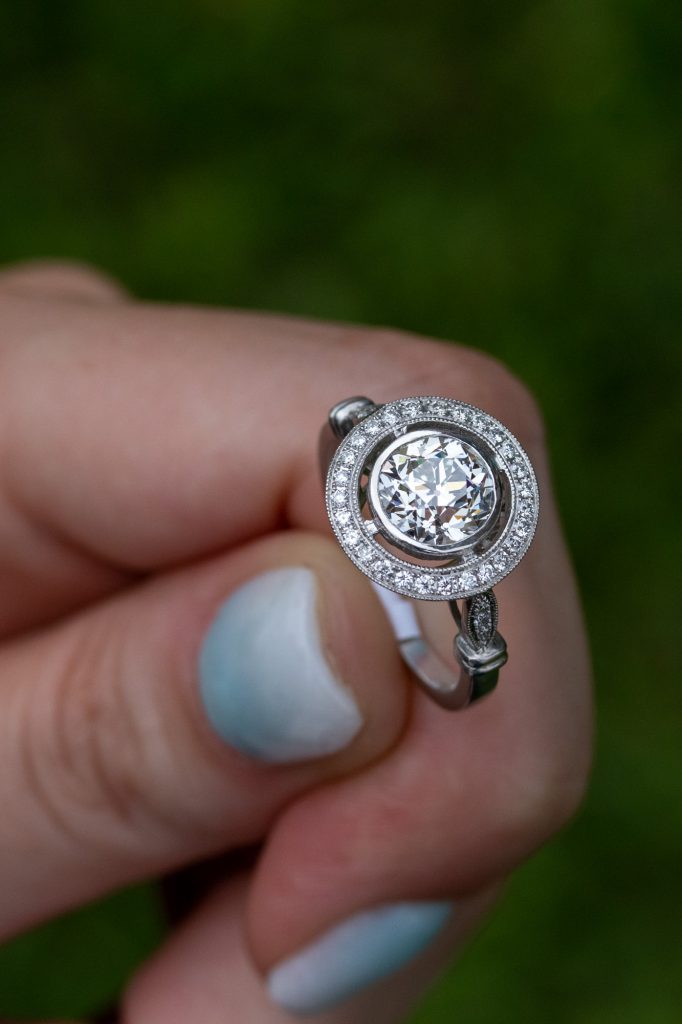
Even with the current rise in popularity for rose and yellow gold engagement rings, reports suggest that as much as 75% of engagement rings are made from white gold.
White gold was first developed in the 1920s, around the same time platinum started to become popular in jewelry making and 20 years prior to engagement rings becoming the leading line of jewelry in America.
White gold quickly became the metal of choice for engagement rings as the white color is neutral so it goes with everything and it complements diamonds naturally with that white on white look. Plus, it is more durable than yellow gold.
White Gold Aesthetics
White gold has a very brilliant white appearance. It is often mistaken for the more “superior” white precious metal – platinum. However, platinum is naturally white and a bit brighter than white gold, while white gold gets its white color via white alloy metals.
Note: White gold also looks like Sterling Silver, but it’s not to be confused with silver when it comes to the price tag.
Overall, white gold has a very cool, elegant gleam to it, and you’ll find it is particularly versatile in terms of skin tones.
What Skin Tone is Best for White Gold?
White gold will look great on any skin tone, but it is especially complementary to fair and rosy skin tones, as well as dark skin tones.
White Gold Properties
As white gold is gold, which is yellow, the white sheen is achieved by using alloy metals of white color, such as nickel, platinum, silver, or palladium. Moreover, it is plated by the white precious metal rhodium.
Rhodium plating is what makes white gold very white, or else it would have a noticeable yellow hue. Moreover, rhodium helps protect the ring from wear and tear, as the alloy metals like silver tarnish by air over time.
Note: White gold uses silver and other precious metals while yellow gold often uses copper. This means white gold is a bit more expensive than yellow gold.
The downside of the rhodium plating is that it wears, and over time, the yellow hue of the natural white gold will appear. The only way to fix it is by replacing the white gold ring with more rhodium.
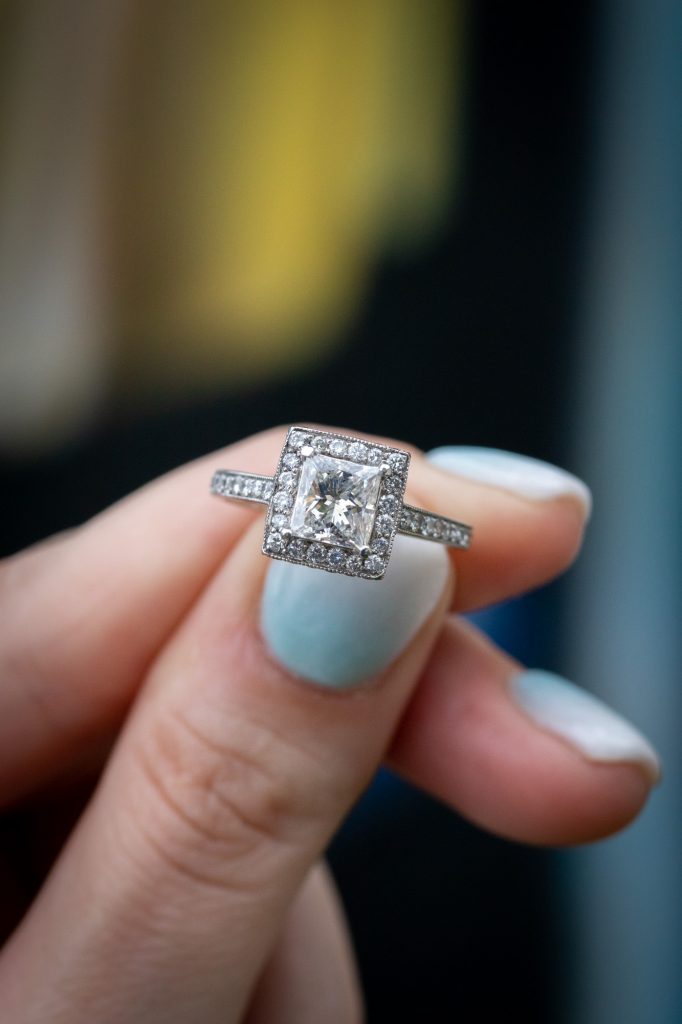
Advantages of White Gold Engagement Rings
White gold is more durable than yellow gold. And like yellow gold, it doesn’t tarnish, rust or corrode.
Due to the popularity of white gold, there is also a wider selection of engagement rings to choose from. For every 1 yellow gold ring, you will see 7 or so white gold rings.
And while white gold is a stronger metal than yellow gold, it is essentially just as malleable, so it can be shaped into intricate designs as well.
The downside of white gold is that the ring will turn yellow over time as the rhodium plating wears off. Unlike yellow gold, this natural wear of the rhodium is not something people particularly appreciate. Therefore, you may have to replate it with rhodium periodically. Thankfully, this is not an expensive endeavor.
Note: Some people have a concern about white gold causing allergic reactions due to nickel being used as an alloy metal. However, the rhodium plating prevents this as rhodium is hypoallergenic. Moreover, the proportions of nickel are usually so low it will never cause an issue unless you are very sensitive to nickel and the rhodium plating has worn off.
Best Diamond Color Grades for Yellow Gold Engagement Rings
As white gold is white, the diamond centerpiece’s color grade becomes more important. To get the best bang for your buck, you will want to stay within an F-H color grade. This will ensure your diamond appears totally colorless to the naked eye.
White Gold Engagement Ring Aftercare
Like all golds, white gold engagement rings will develop small scratches over time. While they will be noticeable at first, they fade over time. As long as the rhodium doesn’t wear off to the point the white gold is showing, the patina is quite nice.
If your ring picks up some surface dirt, rinse it under cold water and dry the ring with a soft cloth and that will clean it right up. Also, like yellow gold, detergents, soaps and other substances may cause the shine of the ring to full, but a nice simple buff with a soft cloth should do the trick.
Over time, rhodium plating is bound to wear off in certain places on the ring. This is natural as you are likely wearing the ring day in and day out. The good news is, you can send it back to the jeweler you bought it from for a replating.
At Diamonds By Raymond Lee, we will replate your white gold ring for free if you bought the ring from us!
For those who want a very brilliant and versatile metal with the look of platinum but the heritage and tradition of gold, white gold is a great choice. The style is one that will never go out of fashion.
Don’t stop here, keep reading the precious metal comparison (platinum vs white gold vs yellow gold vs rose gold) for your perfect engagement ring.
ROSE GOLD ENGAGEMENT RINGS
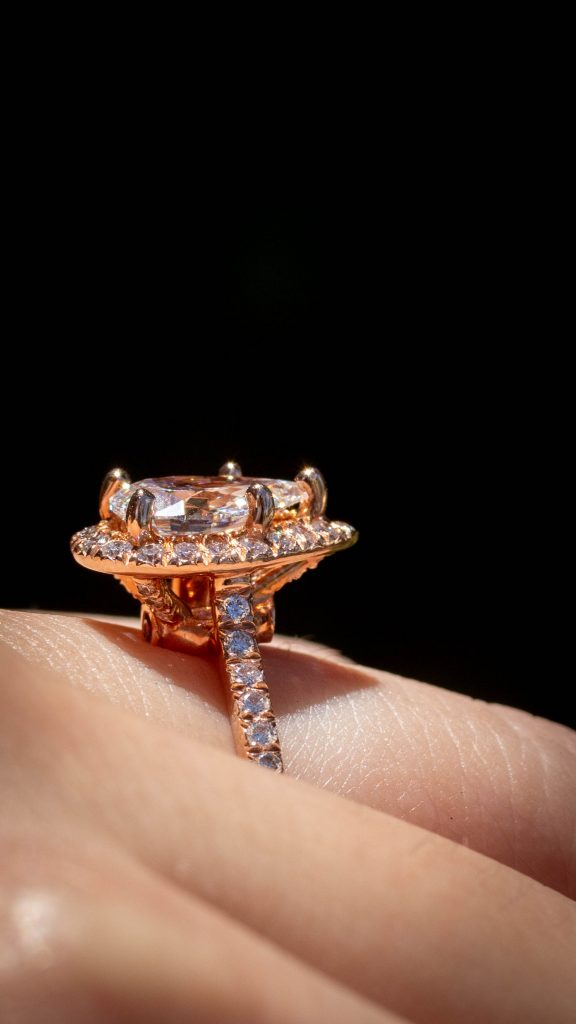
Rose gold, also known as pink gold, was used in jewelry making in Russia as far back as the early 19th century. It didn’t gain attention in the USA until the 1920’s. Even then, it wasn’t the most popular of engagement rings. It wasn’t until the 21st century that rose gold really started to shine in the eyes of Americans. Nowadays, it is one of the most fashionable and contemporary choices, even though it is the gold color that looks the most vintage.
Rose Gold Aesthetics
Rose gold has a very unique tone unlike any other precious or semi precious metal. It has a pink hue that exudes warmth, calmness, and romance.
What Skin Tone is Best for Rose Gold?
Rose gold looks great on all skin tones – warm colored skin tones to fair skin tones. This means dark, olive and rose skins will look great in rose gold.
Rose Gold Properties
Rose gold takes pure gold and mixes it with a copper alloy. So, an 18k rose gold engagement ring is made from 75% gold and 25% copper. This is how it gets its reddish-pink color. 14k rose gold rings will appear pinker due to the increase in copper and 18k rose gold engagement rings will be a warmer, yellowish-red.
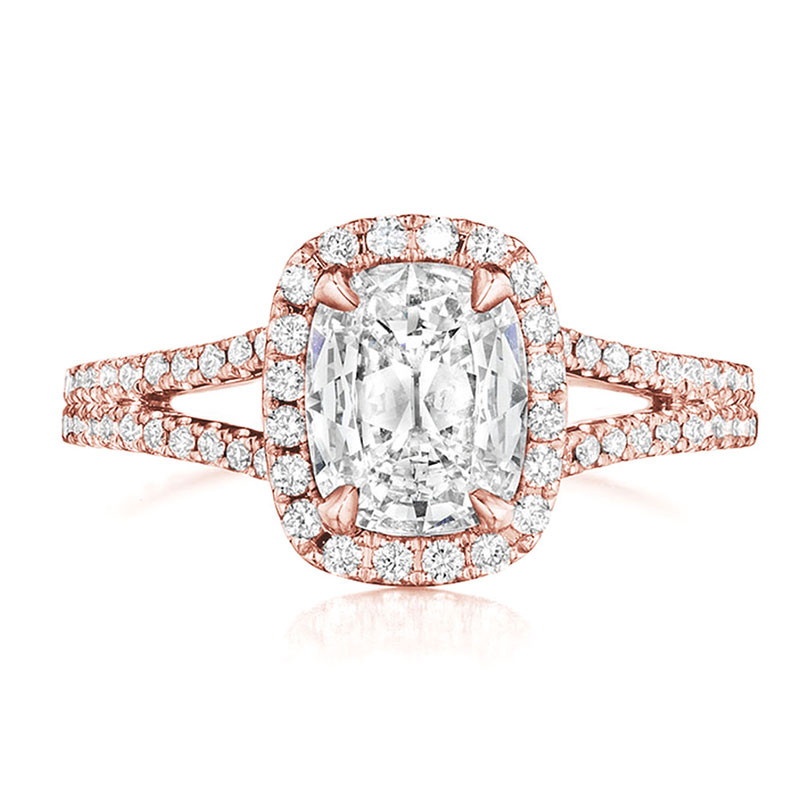
Advantages of Rose Gold Engagement Rings
Rose gold is more durable than white and yellow gold. Moreover, rose gold maintains its shiny appearance extremely well. There will never be a need for reapplication of any sort like there is with white gold, as there is no plating.
What’s more, rose gold will not tarnish, corrode or fade.
The only disadvantage to rose gold is if you have an allergy to copper.
Also, there are typically fewer options to choose from.
Best Diamond Colors for Rose Gold Engagement Rings
Similar to yellow gold engagement rings, rose gold rings can get away with a lower grade diamond color. I-K color is the best range if you want absolute beauty and a good price.
Rose Gold Engagement Ring Aftercare
Rose gold engagement rings can dull over time from contact with detergents, moisturizers, and other chemicals. Ideally, you can take the ring off when using these substances. However, even if you don’t, a simply buff with a soft cloth will brighten your yellow gold engagement ring back up.
As for scratches, rose gold is less prone to scratches he’s, but they are still inevitable. Even with that, rose gold’s wear and tear causes a patina that is quite pleasing.
Overall, a rose gold engagement ring is a superb choice for the woman who appreciates being unique, feminine, and romantic!
Now, let’s get to the platinum section in this platinum vs white gold vs yellow gold vs rose gold comparison.
PLATINUM ENGAGEMENT RINGS
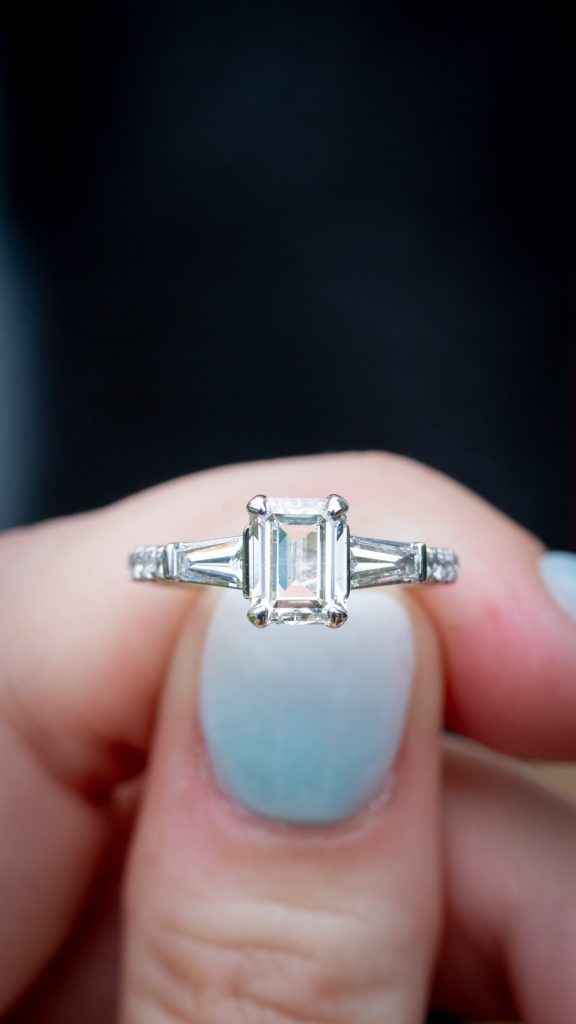
Platinum is among the most popular choices for engagement rings due to its durability, rarity and prestige.
Unlike gold, platinum does not go by carats. For jewelry and engagement rings, platinum will almost always be “950”, which means 95%. The other 50 or (5%) are alloy metals used to refine the precious metal’s characteristics.
Platinum was first discovered in the 18th century. At that time, it was difficult to use in jewelry as platinum has a higher melting point and hardness than gold. It wasn’t until the 19th century that platinum found its way into the jewelry market due to advancements in technology. It really became popular in the 1920s, and it has been the most supreme choice for engagement rings ever since.
Platinum Aesthetics
Platinum has a stunningly brilliant white sheen that is slightly brighter than white gold. It has a very rich look to its luster. The remarkably natural light color of platinum will bring out a diamond’s fire and sparkle magnificently.
What Skin Tone is Best for Platinum?
Platinum will look fantastic on any skin tone. It’s very versatile like white gold. After all, they are both white precious metals.
Platinum Properties
950 Platinum is a blend of 95% platinum and 5% alloy metals, which consist of ruthenium, cobalt, iridium, rhodium, or palladium.
Platinum is harder and less malleable than gold.
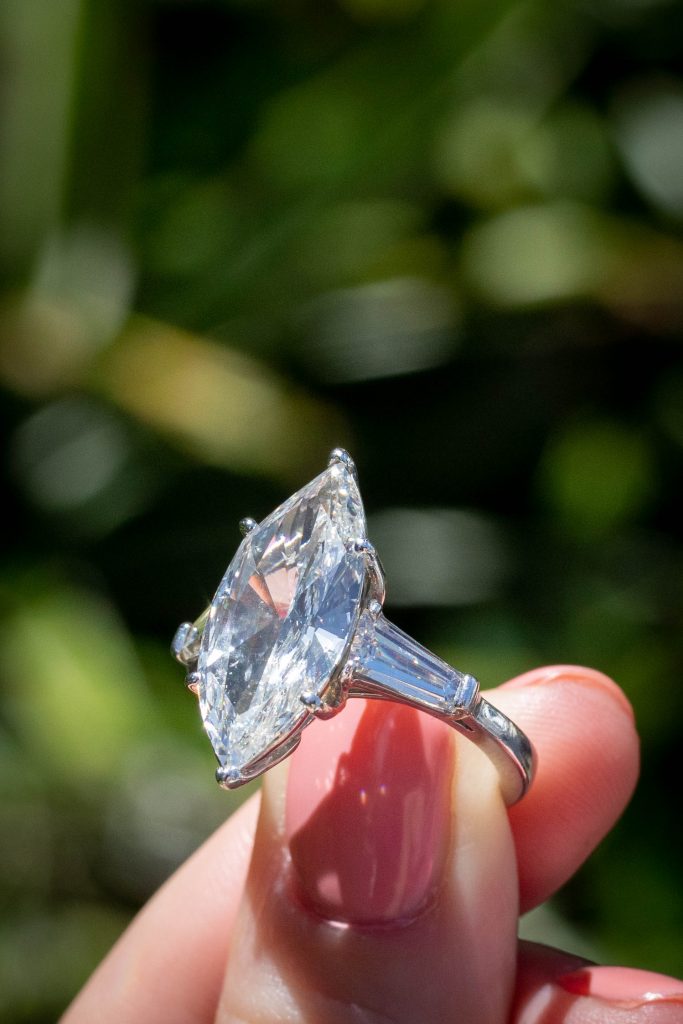
Advantages of Platinum Engagement Rings
Platinum has many advantages. It is resistant to corrosion and oxidation, it is hypoallergenic, and it’s the strongest and most durable precious metal for engagement rings. Platinum does not become thinner with wear and tear, and if scratched, the metal is displaced not removed. So, unlike yellow, rose and white gold, by polishing platinum you can get it back to its original shine without losing any metal.
The downside of platinum is two-fold. It is more expensive than all of the golds and it has a poorer resale value.
Platinum Engagement Ring Aftercare
Over time, wear and tear on platinum engagement rings causes a satin sheen, rather than the high polished gleam it has when new. This is something most people appreciate though. Like yellow gold, it creates a beautiful luster.
Platinum is best cleaned by soaking it in a warm and mild solution of soap and water, then gently rub the ring with a soft cloth to dry.
MIXED METAL ENGAGEMENT RING
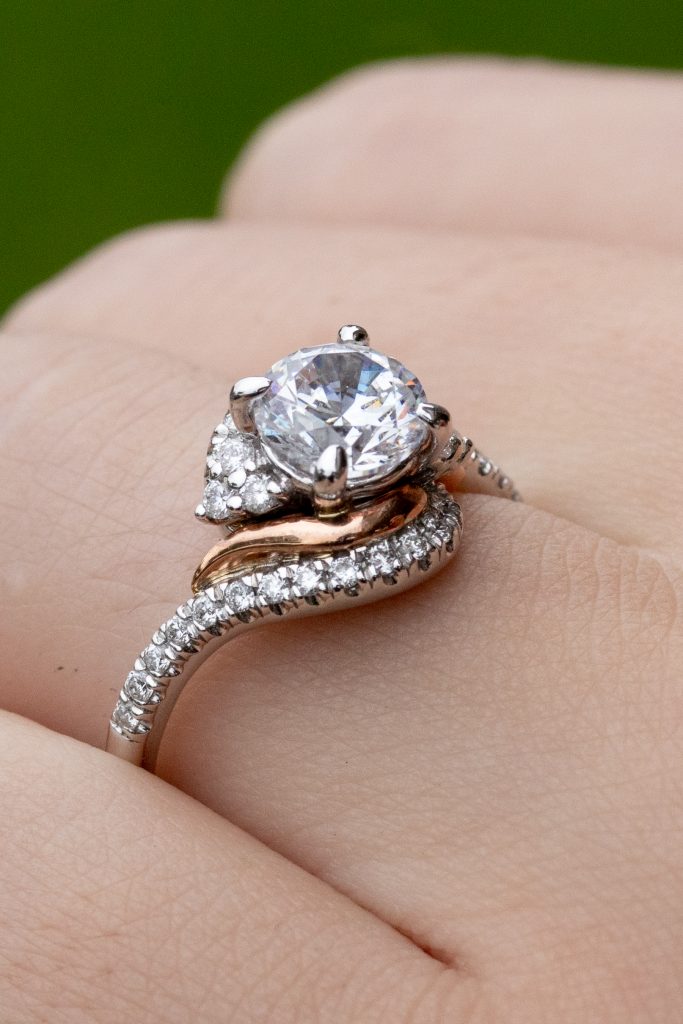
Looking for something more unique? Consider a mixed metal engagement ring. That way you don’t need to choose between yellow gold vs rose gold vs white gold vs platinum at all. You can mix it up!
There are many stunning designs that use a combination of golds. This is one of the hottest looks in the jewelry and engagement ring market right now. Typically, it’s white gold with yellow gold or white gold with rose gold. These two combinations are very complementary.
A mixed metal engagement ring also makes stacking rings easy. You can naturally stack your engagement ring with other rings of any color of gold or platinum.
That said, even if you have a one-color gold ring, you can still mix metals. Again, this is a look most women adore.
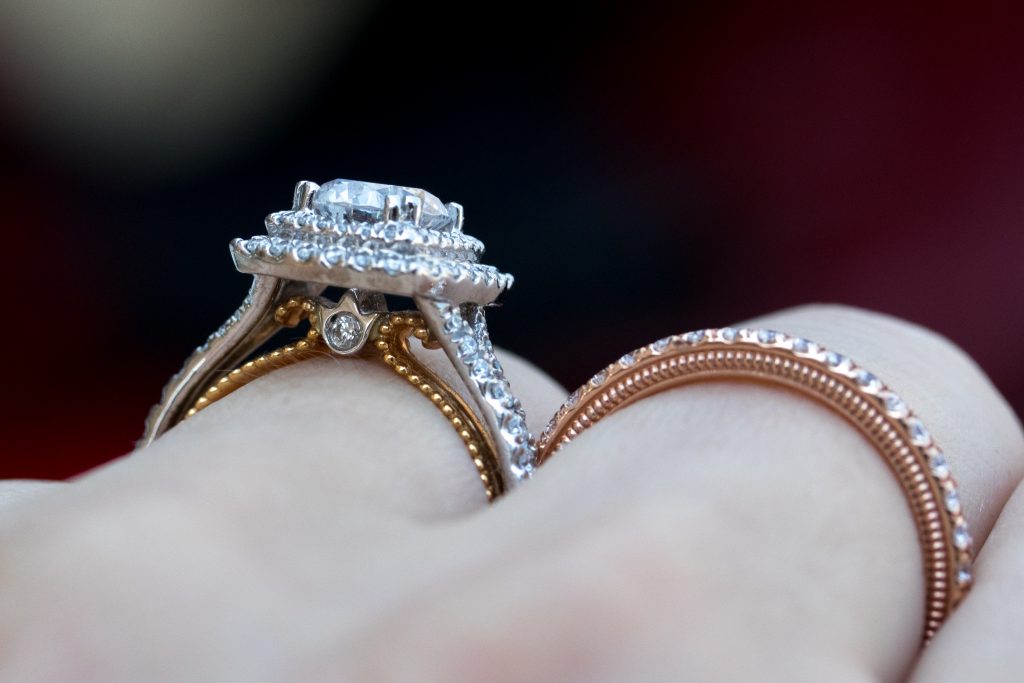
Final Note
All in all, when choosing a precious metal for an engagement ring, consider the proprieties of the metal, skin tone, the diamond centerpiece, aftercare, durability, and the other pros and cons. Most importantly, consider her style (or your style if the ring is for you!).
A tip for you men who want to surprise your girlfriend with a proposal:
Check out her current jewelry collection, see what she likes. Does she wear a lot of platinum, yellow gold, rose gold or white gold?
Ask her if you have any doubts. If you want it to be a surprise, just be slick with how you ask the question.
With the above engagement ring precious metal comparison, it should now be easy to choose between yellow gold, white gold, rose gold and platinum for your engagement ring.
If you have any questions about this engagement ring precious metal comparison (platinum vs white gold vs yellow gold vs rose gold), please feel free to leave a comment below or contact us.
Now that you have read our precious metal comparison for engagement rings, and you likely have a precious metal in mind, read about the various engagement ring settings, as like choosing a diamond centerpiece and the precious metal, the setting is very important too!
Ten articles before and after
Gem-Set Rolex Watches in Boca Raton | Best Price for a Diamond Rolex
How Can I Buy Investment Diamonds in Boca Raton?
Review: First-Ever Fully Iced Out White Gold Rolex Sky-Dweller ref 326139
White Dial vs Black Dial Stainless Steel Rolex Daytona Comparison
Rolex Sky-Dweller Review Featuring Yellow Gold Sky-Dweller Ref. 326938
Review: 18K Yellow Gold Rolex 18108 President Day-Date
Review: Bell & Ross 18k Rose Gold BR01 Tourbillon Aviation Watch
Recap of the Diamonds and Donuts Car Show on July 12th, 2020
Diamond Jewelry Inspiration in South Florida with the Lovely Alexa Collins
